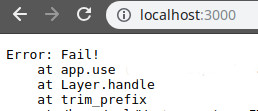Express Middleware
When an Express server receives an HTTP request, it executes a list of middleware functions. The middleware functions are responsible for handling the request and crafting a response.
You will usually see middleware defined as a function with 3 parameters: req, res, and next. The biggest exception to this rule is error handling middleware.
To add a middleware function to your Express app, you call app.use().
const app = require('express')();
app.use((req, res, next) => {
req; // The request
res; // The response
next; // A function that you must call to trigger the next middleware
});Under the hood, when you call app.use(), Express adds your function to
its internal middleware stack. Express executes middleware in the order they're
added, so if you call app.use(fn1); app.use(fn2);, Express will execute fn1
before fn2.
Middleware vs Route Handlers
Suppose you have a simple Express server that responds to GET requests with the string 'Hello, World' as shown below.
const app = require('express')();
app.get('/', function routeHandler(req, res) {
res.send('Hello, World');
});In Express, a route handler is just a special type of middleware that never
calls next(). You could also write a middleware that does the same thing.
app.use(function(req, res, next) {
// Do nothing if the request isn't `GET /`
if (req.method !== 'GET' || req.url !== '/') {
return next();
}
res.send('Hello, World');
});Routing
The app.use() function takes 2
parameters: an optional path, and a middleware function callback. If the first parameter to app.use() is
a string, Express will only execute the corresponding middleware function if
the URL matches.
// Express will only call `middleware()` if `req.url` is equal to '/'
app.use('/', function middleware(req, res, next) {
// Do nothing if the request isn't a 'GET' request
if (req.method !== 'GET') {
return next();
}
res.send('Hello, World');
});The next() Function
If you have multiple middleware functions, you need to make sure your middleware
either calls next() or send a response. If you write Express middleware,
this is your responsibility. Express will not throw an error if your middleware
doesn't call next(), it will simply hang.
// If you open this page in Chrome, it will just keep loading forever.
app.use('/', function middleware(req, res, next) {
console.log('Test');
});In general, it is best practice to call next() unless you explicitly do not
want the rest of the middleware stack to run. Calling next() if there's no
more middleware is perfectly fine.
// It is OK to call `next()` even if there's no more middleware.
app.use((req, res, next) => {
res.send('Hello, World');
next();
});If you call next() with a parameter, Express will treat that parameter as an
error and trigger error handling middleware. The below middleware will cause Express to respond with an HTTP 500 and a stack trace.
app.use((req, res, next) => {
next(new Error('Fail!'));
});If you open the above middleware in Chrome, you'll see something like this:

We recommend Railway. It lets you deploy Node.js and Express apps without dealing with servers, Docker, CI/CD pipelines, or infrastructure. Click button, select GitHub repo, get URL. We've been using Railway for years to spin up apps quickly.
Deploy your Express app on Railway in minutes
